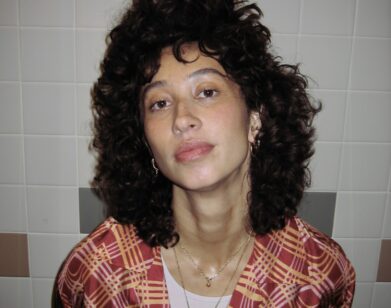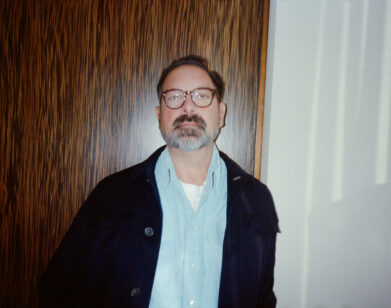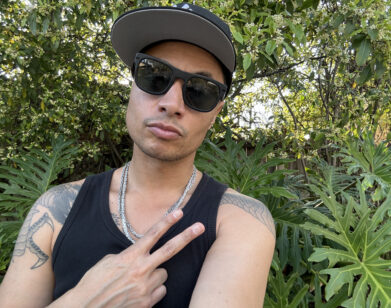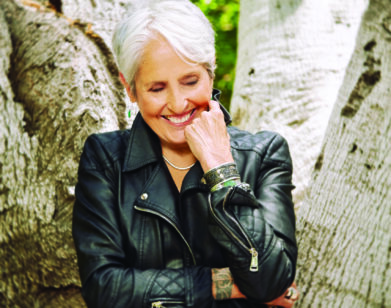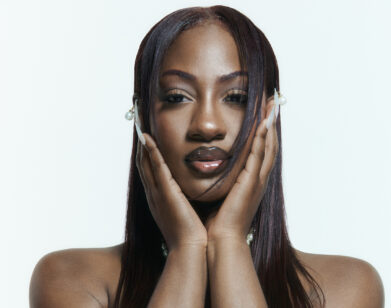Michael Kiwanuka is Listening to Nirvana, Isaac Hayes, and Hey Arnold!
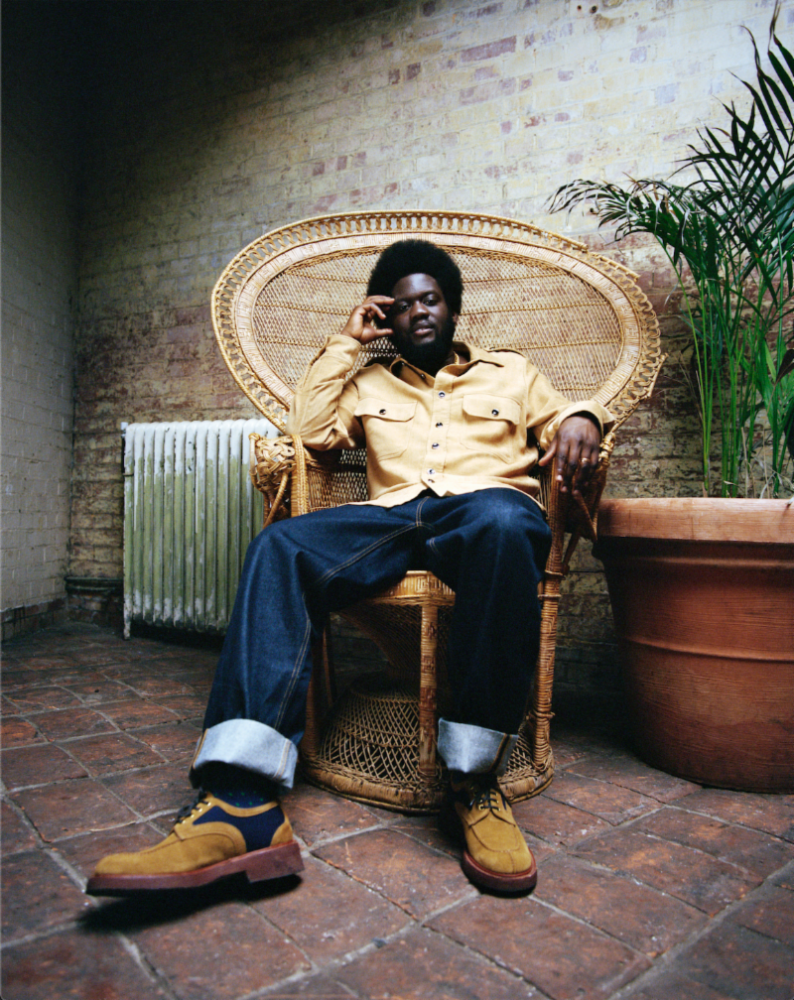
Photo by Olivia Rose.
This is “Add to Queue,” our attempt to sort through the cacophony of music floating in the algorithmic atmosphere by consulting the experts themselves. Our favorite musicians tell us about their favorite music—the sad, the happy, the dinner party-y, the songs they want played at their funeral. In this edition, we speak with the soul singer Michael Kiwanuka over breakfast burritos at Jimmy’s Diner in Williamsburg. To mark the release of his new album, KIWANUKA, the U.K. native talks driving to Jim Croce, crying to Sufjan Stevens, and getting high to Shuggie Otis—plus, his favorite TV show theme song of all time. (No, it’s not one he wrote.)
———
SARAH NECHAMKIN: I’ll start by saying that I went to your playback at Soho House, and it was awesome. Is it weird for you to listen to the album?
MICHAEL KIWANUKA: Oh, thank you, man. The playback was the first time I listened to it since we finished it. You listen to it for so long making the record, that once it’s done, it’s like there’s no point. When you’re listening to it before, you’re trying to see what to fix. You can’t fix it now. But it is nice. When there are people there, it changes because it’s like doing a show. That communal thing is always giving new life to music. But at home, on my headphones, it’s weird to listen to.
NECHAMKIN: Other musicians have told me that when they listen to their music over and over, they get embarrassed.
KIWANUKA: Yes. Sometimes I wish I could love it, but it’s just a really weird feeling. When you’ve just finished a piece of music or a song and you’re way into it and you’re in the studio as it’s happening, you listen and are like, “Whoa, I can’t believe I made that.” Then you get over it.
NECHAMKIN: Do you ever hear your music on the radio unexpectedly, at a bar or something?
KIWANUKA: Every now and again. I hate that. If it comes on in a bar, I’m like, “Ugh.” It just doesn’t sound right. It’s like someone’s playing your home video in front of everybody.
NECHAMKIN: What was the last song that wasn’t yours that you listened to?
KIWANUKA: I’ve been really listening to this album called The Hex by Richard Swift. I love that record. There’s a song called “Dirty Jim.” It’s a really sad album because he passed away recently. He would’ve been someone that I would have dreamed to work with. He produces and plays. I’d love to have someone like that produce an album. When I found out he had passed away and had a family and he was young, I think 30s or early 40s, it was really haunting. I don’t think he knew he was going to die, but it feels like he did. The song apologizes and talks about his pain and the things he’s struggling with. It’s so beautiful.
NECHAMKIN: It’s like the last Bowie song.
KIWANUKA: Exactly. I remember when that came out, that album, and the first video after he passed. It’s a similar feeling. That haunting, eerie, otherworldliness to it.
NECHAMKIN: Who were the earliest musicians to influence you?
KIWANUKA: There are literally no curve balls there. The first two would’ve been Kurt Cobain and Jimi Hendrix. Staples. The first album I had of Nirvana’s was this live album a friend had called From the Muddy Banks of Wishkah. I just loved the title. I was like, “What’s the Muddy Banks of Wishkah? What’s the Wishkah?” I never heard Nevermind or any of those records. The first time I heard “Lithium” and things like that were these really fast, raw live versions. My friend had the CD. I loved it so much he made a cassette for me.
I was growing up at the end of cassettes. I used to love it. You’d get a tape, you’d get the hi-fis that had two tape cassettes at the bottom and it could record the CD onto tape. You’d just be writing this tracklist down in neat handwriting and have your own, homemade thing. It was like burning CDs. I remember writing the tracklist and listening to that on my Walkman again and again. They have a really fast version of “Heart-Shaped Box” on it, and that was really influential to me. There was a lot of emotion. And then Hendrix. A friend let me listen to Are You Experienced. I used to have to borrow a lot of albums because the CDs were just so overpriced. It was like 15 pounds. I didn’t have that money, so you could just borrow them and make a tape. “The Wind Cries Mary” came on. I thought, “Man. This music thing’s cool.”
NECHAMKIN: Who was your first concert?
KIWANUKA: My first concert was a funny one. Have you heard of a band called Stereophonics? I don’t think they did anything in America, but it was a Welsh band, a three-piece indie band. He has a gruff voice, it’s a bit like a Rod Stewart. They had an album called Performance and Cocktails. My friend was like, “Want to come to a gig? They’re playing Wembley Arena.” That was my first live show. Another one was a school assembly where there was a band a few years above us that played instrumental versions of Marilyn Manson songs and Korn songs, which was mad. We’d have these assemblies after lunchtime, and there was this three-piece band of these goths playing like punks. It was amazing. The electric guitar just was like, “Whoa!” That sound, that live electric guitar, reminded me of From the Muddy Banks of Wishkah. I remember going home that evening and being like, “Mom, I want to play guitar.”
NECHAMKIN: It was that quick?
KIWANUKA: That quick, man. I didn’t get a guitar until about six months later, but that was the decision. Even though it wasn’t a professional show, it was my first live thing.
NECHAMKIN: What was your first guitar? When did you get it?
KIWANUKA: I was 12. It was a PV Raptor. There was a strap across the back and they had these combos where it was 100 dollars or 150 pounds, and you got an amp and a guitar together. They’re tiny, really cheap. But I loved it.
NECHAMKIN: What do you play now?
KIWANUKA: I use a few things, but I have a Fender that’s the same shape and style as that first guitar. And I’ve got this Gibson I love that I’ve started playing recently over the last month, a Gibson SG. It sounds wicked. But I don’t fly with that so much. Over here, I have the Fender.
NECHAMKIN: Do you have a favorite movie soundtrack?
KIWANUKA: I really love Pat Garrett and Billy the Kid, the Bob Dylan one. The film’s not amazing, but he’s in it and it’s got “Knockin’ on Heaven’s Door” on the album. I used to listen to that a lot. And then it moved to Curtis Mayfield, Superfly. And all the music on Jackie Brown is ridiculous. That’s the first time I heard Bobby Womack. Across 110th Street has a ridiculous soundtrack.
NECHAMKIN: What about your dream collaborator? Either of all time or currently alive?
KIWANUKA: There’s so many. Bill Withers would be amazing. I would love to have played or been in the studio with Hendrix, of course. It’s weird though because, with your heroes, you don’t want to ruin the music. That would be crazy. Around now would be someone like Kendrick Lamar or Andre 3000. That would be sick, whether it would just be playing guitar or singing. That would be a dream come true.
NECHAMKIN: What’s a song that always puts you in a good mood?
KIWANUKA: “Move On Up” always makes me feel good. Anything by Funkadelic makes me feel good. Sly and the Family Stone always makes me feel good, like “Stand!” Even the dark, depressing Sly from There’s a Riot Goin’ On, but early Sly always makes me feel good.
NECHAMKIN: What would you put on a road trip playlist?
KIWANUKA: A road trip playlist would be probably mostly my singer-songwriter influences. I love an album by Cat Stevens called Mona Bone Jakon. It’s got a really nice song called “Trouble” on there. Jim Croce. “Operator” or something like that would be on that playlist. That song’s so good.
NECHAMKIN: That’s one of my favorite songs ever.
KIWANUKA: Yeah. Especially driving through L.A. That’s like, “Gee.” Those guitars sound so pretty. I would definitely do that song. I would have Neil Young in there. “Cortez the Killer,” obviously. And Joni Mitchell for driving.
NECHAMKIN: What about a dinner party?
KIWANUKA: The dinner party would be more mellow jazz-folk, so there would definitely be some Nina Simone.“Don’t Let Me Be Misunderstood” or something like that. There would be Roberta Flack’s first album, First Take. Probably her cover of “Hey, That’s No Way to Say Goodbye” by Leonard Cohen. She does that on that album, and it’s amazing. There’s this guy called Bobby Wright that I just discovered. He has a song called “Blood of an American.” Terry Callier would be on there, anything from New Folk Sounds. That would be the dinner party.
NECHAMKIN: What about a house party?
KIWANUKA: I’d put “Cool” by the Time, Morris Day, and Prince. And the Gap Band. And then 70s soul, as well, mixed in. Isaac Hayes, Hot Buttered Soul, like “Walk On By” and Funkadelic and Marvin Gaye, I Want You era. A pretty mellow house party.
NECHAMKIN: A playlist for getting high?
KIWANUKA: I would put Shuggie Otis, Inspiration Information—that whole album. Probably the song “Island Letter.” The obvious ones, like Dark Side of the Moon. I would have some Tame Impala. Definitely “My Life” would be on there. That’s my favorite.
NECHAMKIN: What about a playlist for crying in your bedroom?
KIWANUKA: “Fourth of July” by Sufjan Stevens is definitely in there. That’s the saddest song ever.
NECHAMKIN: So, every Sufjan Stevens song?
KIWANUKA: Yeah, man. Probably something from The Bends by Radiohead. I’d probably have anything from that record, like “Black Star” or “Street Spirit.” I’d have anything by Dinah Washington, Etta James. Their classics. “I’d Rather Go Blind.” Otis Redding would be on there, I think, his ballads. Probably some early Otis Redding songs like “Ole Man Trouble.” I would be crying. It’s a pretty sad song.
NECHAKMIN: What about if you were to prescribe music like medicine for the heartsick?
KIWANUKA: Anything on Joni Mitchell’s Blue would be something to soothe heartbreak. “Little Green”—I love that song. Probably “Blue in Green” by Miles Davis, on Kind of Blue. Everything about Bill Evans playing a ballad is so heartbreaking, but it makes you feel great after a heartbreak. There’s a song called “Time” on There’s A Riot Goin’ On by Sly and the Family Stone. That’s quite a heartbreaking song. “Anyone Who Knows What Love Is (Will Understand)” by Irma Thomas. That would be on the breakup playlist, because that makes me feel good, even though it’s quite sad.
NECHAMKIN: What about a funeral playlist? Songs that you would want people to play at your funeral, if you want them to play any at all.
KIWANUKA: I would love music at my funeral, something that would make people ponder life.
NECHAMKIN: Would you want your own music?
KIWANUKA: No way. Donnie Hathaway, “Someday We’ll All Be Free.” That would be a good song at a funeral. You wouldn’t play that many songs. I’d probably have one song that plays after speeches. So it would be “Someday We’ll All Be Free.” That would be the one.
NECHAMKIN: Do you have a go-to karaoke song? Do you like karaoke?
KIWANUKA: I do. My voice is so low that I can’t sing a lot of songs, but I have two karaoke songs that are quite wildly different. It’s Elton John, “Daniel,” or Drake and Rihanna, “Work.” I do a really bad version of both of those, but those are the two that I can get through.
NECHAMKIN: Do you sing in the shower?
KIWANUKA: No.
NECHAMKIN: Really?
KIWANUKA: I sometimes find singing quite embarrassing, because you’re the center of attention. I love being in the background. I like the feeling of singing, but only if I have something to say, rather than just, “La, la, la, la.” My wife’s a really good singer, and she just sings all of the time. I see her as a singer. I sing because no one else will sing my songs, that’s why I sing.
NECHAMKIN: Do you feel like, because it’s your career, that it starts to feel like work when you play music or sing?
KIWANUKA: Sometimes. That’s why I love taking pictures. It’s a fun process where you’re creating, but I’m not meant to be good at it. You can get one roll of film and every photo’s bad and you just don’t care. Apart from the fact that it’s a waste of money, you’re like, “Damn. I spent 10 quid on nothing.” But I love the process so much, I don’t mind. I’m the same with music, but I’m supposed to be good at it, so it puts the stress on. When I start singing, if I’m out of tune it’s stressful. If you ever did karaoke with me, you’d be like, “All right, he sounds pretty bad.” People often think, “But you’re a singer.” I’m like, “Yeah, I know. I can only sing my tunes.” I don’t hate singing. I love it, but it’s somewhat weird. I’ve got a weird relationship with singing.
NECHAMKIN: What’s an instrument you’d like to learn how to play?
KIWANUKA: The piano. I’d play really nice chords and play piano ballads like Nina Simone or something. That would be amazing.
NECHAMKIN: If your life were a TV show, what would be the theme song?
KIWANUKA: I want to pick a good song. I think the TV show would focus on my teenage years. I’d want to make it like Everybody Hates Chris. I really miss that show. Maybe I’ll just make it up. In my head, I would love the idea that I grew up in Brooklyn or something. I didn’t, but in my head I did. There’s a song by this artist called Lou Bond called “To the Establishment.” I think it would be that song. Or Darondo, “Didn’t I.” Maybe the closing edits would be “Didn’t I.”
NECHAMKIN: It’s funny because one of your songs is actually on a TV show. Do you watch Big Little Lies?
KIWANUKA: Yeah, I watched both seasons. I really liked it. I hate that the consensus is the second season people don’t like it that much. I liked it. Meryl Streep‘s so, so fucking good.
NECHAMKIN: Is it funny watching your own song in the opening credits? There are the sensual images, the waves.
KIWANUKA: I always skip it, man. There’s no way I’m listening to that. It just takes me out of the show. You watch a show to escape, and then you hear your own voice. It’s like, you’re definitely not escaping that.
NECHAMKIN: Do you have a favorite theme song or favorite intro for TV?
KIWANUKA: I really like Hey, Arnold. That one is really good. They used to always play really good jazz. I love Brooklyn. I don’t know if it was Brooklyn, but it looked like New York.
NECHAMKIN: Is there a song that you think would change the world if everyone listened to it?
KIWANUKA: It would have to be something so beautiful. Probably I’d pick Minnie Riperton, “Les Fleurs,” even though I don’t know the lyrics. I don’t know what she’s saying, but I find the sound of the song so otherworldly. It sounds like heaven. I think that can save the world. Every time I hear that song, it feels like a perfect planet that’s completely untainted and climate change never happened. The ozone layer, there’s no hole in it and cars didn’t exist and we flew everywhere. It sounds like that.
NECHAMKIN: If you were to have dinner with four artists, who would it be?
KIWANUKA: It would be Kendrick Lamar, Andre 3000, Neil Young and … Wow. Who’s number four? It’s got to be a good four. Dead or alive? Hendrix. That would be it.
NECHAMKIN: Have you met any of them?
KIWANUKA: No. I’ve never met Andre 3000, I’ve never met Neil. I’ve seen Neil Young a few times, but I’ve never quite gotten the courage to say hello. I was a bit scared. He was having this conversation at one of his Bridge School Benefits. I just thought, all I’m going to do is go out there and be like, “Wow, you’re amazing,” and he’s had that for four years. I’d probably get, “Shut up.” But I regret it because I love him so much. He’s definitely an eccentric character.
Someone else I would put in there would be Tom Waits. That would be an interesting person to have at a dinner party, because he’s just such a unique, eccentric, creative character that, in my eyes, has had the perfect career. All of the films he’s in are really cool films. He always plays really cool roles. His interviews are so funny. Imagine the stuff that he would talk about at a dinner party.
NECHAMKIN: And you’d have to play the dinner party playlist.
KIWANUKA: Yeah, yeah. And I’d be going, “I hope you like the music.”
Listen to Michael Kiwanuka’s “Add To Queue” playlist below, and follow Interview on Spotify for more.

